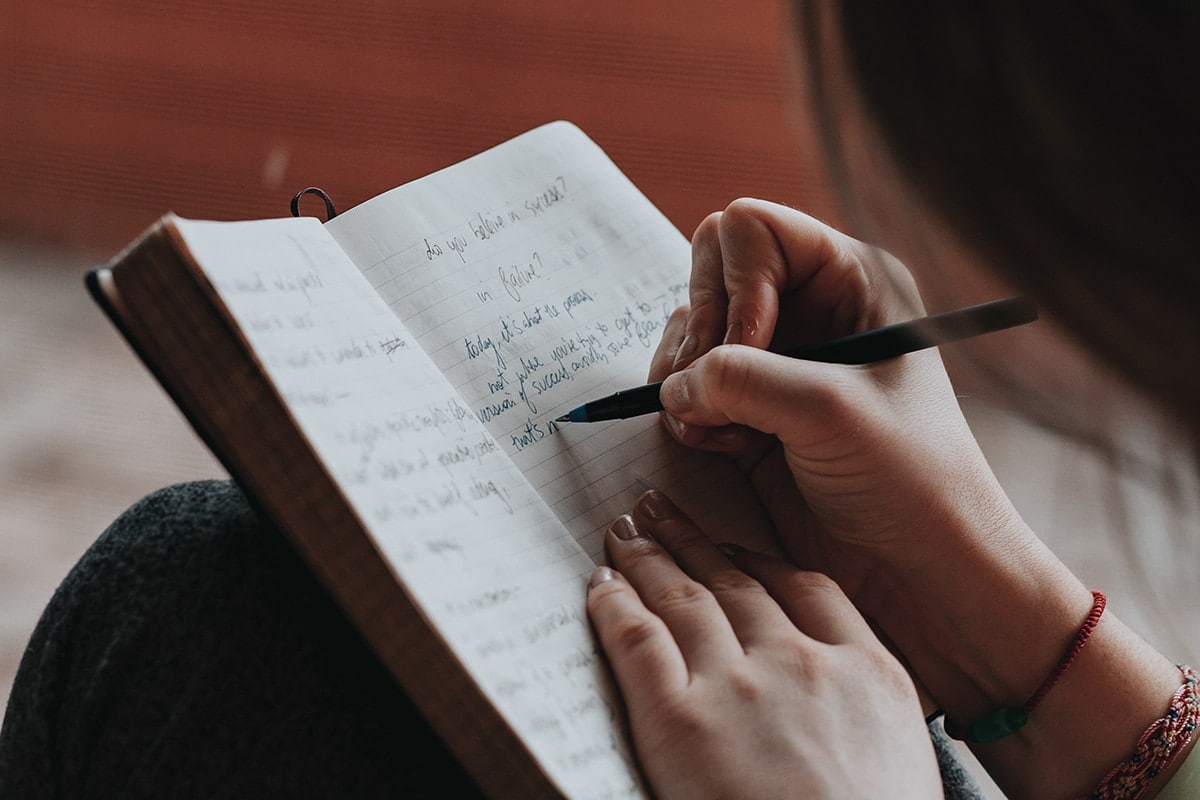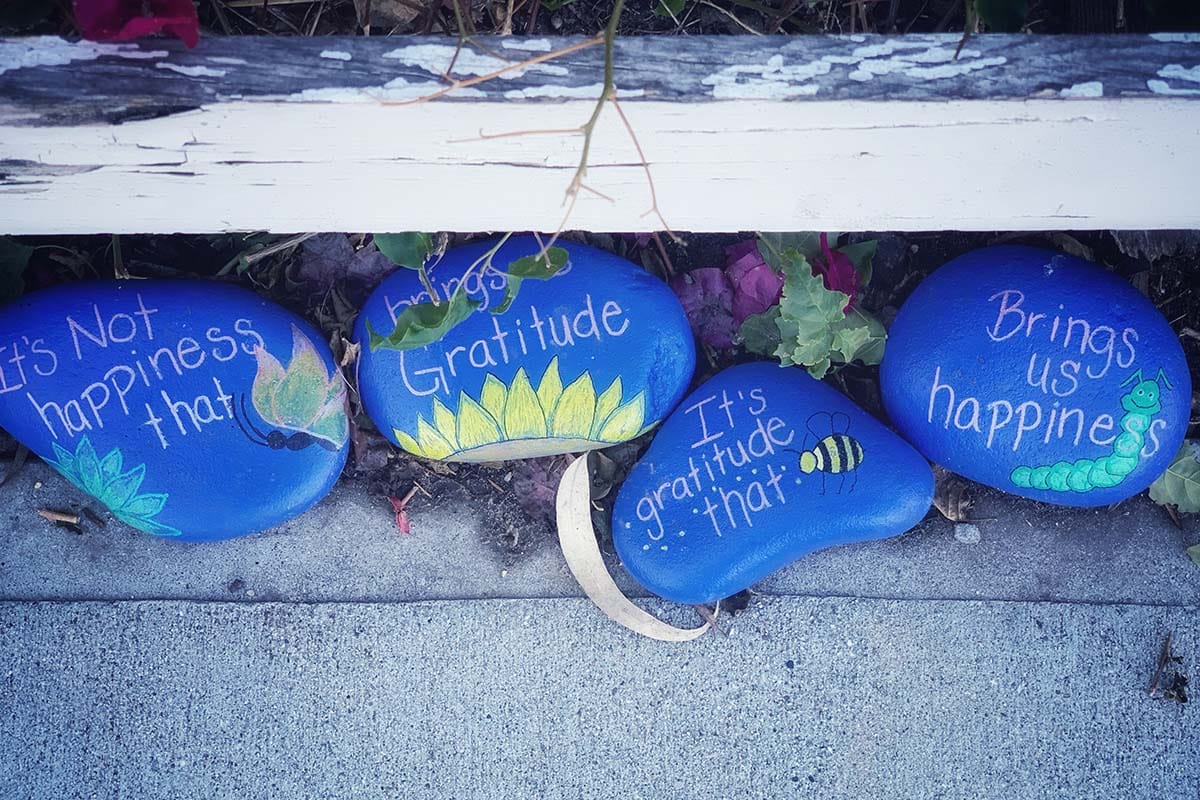A daily gratitude changes your life. What was the last thing or situation you had a moan about? And what happened or what did you experience this week that filled you with a sense of deep gratitude?
Most of us will be able to answer the first question without having to think too hard and would need at least a moment or two to ponder the second one.
Even though we might be a bit reluctant to admit or not even aware of it, most of us are navigating life with an attitude of entitlement. This blog post dives deep into the scientifically proven transformations that can happen if we make a conscious effort to develop an attitude of gratitude instead and make that our modus operandi.
One way of doing this is by writing a daily gratitude list or journal. We look at this practice, the benefits that come with it and provide ideas and tips that should make it easy for you to get started and experience the positive impact of cultivating gratitude first-hand.
What is a gratitude list/journal?
As hinted at in the paragraph above, we can build our capacity for gratitude – and it has the potential to change our life. Let’s make sure we’re all on the same page, though, first:
Gratitude stems from the Latin word gratia, which means gratefulness, grace or graciousness – depending on the context.
Robert Emmons, professor of psychology at the University of California and the world’s leading scientific experts on the topic, explains in an essay he wrote for the Greater Good Magazine that gratitude basically has two components:
“First, it’s an affirmation of goodness. We affirm that there are good things in the world, gifts and benefits we’ve received. This doesn’t mean that life is perfect; it doesn’t ignore complaints, burdens, and hassles. But when we look at life as a whole, gratitude encourages us to identify some amount of goodness in our life.
The second part of gratitude is figuring out where that goodness comes from. We recognize the sources of this goodness as being outside of ourselves. It didn’t stem from anything we necessarily did ourselves in which we might take pride. We can appreciate positive traits in ourselves, but I think true gratitude involves a humble dependence on others […]”.
A gratitude list or journal is a notebook that you dedicate to writing down what you are grateful for on a daily basis. It helps you appreciate what you have in this very moment and can include the past – e.g. a loving grandparent who shaped you and taught you a life skill or lesson that you are still benefitting from – as well as hopes for the future.
A gratitude list is usually kept as a bullet point journal with 3 – 5 items every day. Making the gratitude list a daily ritual will have you pay more attention, help you improve your ability to notice the little things that bring you joy and happiness and magnify what is good in your life right now as well as the positive emotions that come with it.

The benefits of being thankful
Keeping a gratitude list will positively impact your physical health, psychological wellbeing and your social life. And this is backed up by science: Studies show overwhelming results after just three weeks of actively practising gratitude.
This list of benefitvs is quite long:
-
Increases intensity and frequency of positive emotions.
-
Will have you experience deeper joy and more pleasure.
-
Will have you feel more awake, alive and alert.
-
Greater sense of optimism, hopefulness and happiness.
-
You become more stress-resistant, resilient and able to deal better with adversity.
-
Promotes a sense of calm and clarity.
-
Strengthens the immune system.
-
Can help with depression.
-
Fewer aches and pains/less bothered by them.
-
Improves quality and length of sleep.
-
You’ll take better care of your physical health and maybe start exercising more.
-
Makes you more compassionate, forgiving, helpful and generous.
-
Helps you feel more connected to others and hence less lonely.
-
Improves your communication skills and your relationships with others.
-
Makes you better at achieving goals and heightens your sense of self-worth.
Harvard Health Publishing recounts in an article with the title “Giving thanks can make you happier” that one research team asked participants of a study to “write and personally deliver a letter of gratitude to someone who had never been properly thanked for his or her kindness, participants immediately exhibited a huge increase in happiness scores. This impact was greater than that from any other intervention, with benefits lasting for a month.”
Writing a daily gratitude list will slowly shift your perspective and help you become more aware of as well as focus on the good things in your life. According to gratitude researcher and expert Emmons, this might lead to the “realization that we get more than we deserve.” A daily gratitude changes your life for the better.
How to start, practice and keep it up
A daily gratitude changes your life
A daily gratitude changes your life, but can ask an effort. As with any new practice, it is all about consistency. Once you commit to a daily gratitude list, make it a priority as you do with brushing your teeth. Obviously, there is no set time when you have to do it but many people find that it makes for a great ritual to start the day with in the morning or end it at night before you go to bed.
Writing a gratitude list will usually take you between 10-15 minutes maximum. For the time and effort you have to invest into this self-care practice, the pay-off in terms of your overall wellbeing is huge.
If you can see yourself struggling with consistency, though, it might be helpful to find an accountability buddy.
When you start something new that you want to implement into your life, it is also important and very powerful to know your personal “why?”. Ask yourself why you want to make a gratitude list a part of your daily routine. Then take the answer and ask yourself “why is this important to me?”. Repeat the process seven times. This is a great exercise to get to the bottom of your motivation to give this your best shot. A “why” like that is a strong foundation to come back to on days when you don’t really feel like doing a gratitude list.
When it comes to writing a daily gratitude list, the devil’s in the detail: So, be specific! You don’t have to write much or even full sentences, but you want to go deeper than “I am grateful for my sister.” If you don’t, you’ll soon find yourself repeating the same things over and over again without actually feeling gratitude.
We are so used to intellectualising our experiences that we forgot how to be present in our bodies for and with them. Therefore, ask yourself why this particular moment, gesture, person or animal means so much to you. Once you have explored the question, write your answer down and take a moment to actually experience the gratitude, the “wow, I can’t believe how blessed and lucky I am to have xyz in my life because…” in your body.
Last but not least: Read back through your gratitude lists whenever you feel in need of a reminder of how many good things you have or are happening in your life on a daily basis.

Ideas: What to put on your list
Especially when you are new to practising gratitude, you might not be entirely sure what to write down in your journal. Or you end up with a “gratitude block” after doing it for a while. Book your stay and we will learn you all abut it.
In this section we have some prompts that will hopefully help you overcome these hurdles:
-
What was the highlight of your day?
-
Gratitude towards yourself
-
Gratitude towards others
-
Sometimes it helps to completely shift your perspectiveUsually, we focus on what we are grateful for receiving. But what are you grateful that you can give to others/the world?
-
“5 Morning Rituals that Help me Win the Day”Author and podcaster Tim Ferris shares this his free PDF and writes a daily gratitude list as well. He has a very strategic approach.
-
1Write down an opportunity you have today. It can be something as simple as calling your parents because they’re still alive.
-
2Something great that you experienced or that happened to you or that you witnessed the previous day.
-
3Write about an old relationship that shaped or helped you or that you valued highly.
-
4Something within sight. That’s a tip he got from Tony Robbins to counter our tendency to focus on abstract things like “my career”. It could be the comfy couch you’re sitting on, that piece of art that you were able to afford, your favourite coffee mug that a dear friend got you for your birthday or the full moon outside your window.
More ways to practice gratitude
A daily gratitude changes your life, but a daily list is not the only way to practise gratitude:
-
Meditation and mindfulness can help you become fully present in a moment of gratitude and experience it with your whole being.
-
You could express gratitude verbally or through a letter or note or even a random act of kindness to pay it forwards.
-
You could make “Things I am/we are grateful for…” a regular topic at your dinner table and get to know those you share your gratitude moments with on a deeper level.